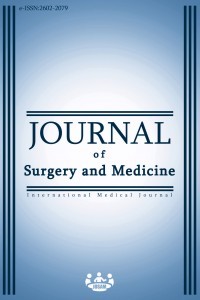Comparison of intestinal metaplasia and Helicobacter pylori positivity in patients from different age groups with antral gastritis
___
- 1. Sitarz R, Skierucha M, Mielko J, Offerhaus GJA, Maciejewski R, Polkowski WP. Gastric cancer: epidemiology, prevention, classification, and treatment. Cancer Manag Res. 2018;10:239–48.
- 2. Kesici U. Comparison of intestinal metaplasia and Helicobacter pylori scores in patients undergoing upper gastrointestinal endoscopy. Cukurova Med J. 2018;43:574-80.
- 3. IARC Working Group on the Evaluation of Carcinogenic Risks to Humans. Lyon, 7–14 June 1994. Schistosomes, liver flukes and Helicobacter pylori. IARC Monogr Eval Carcinog Risks Hum. 1994;61:1–241.
- 4. Malfertheiner P, Megraud F, O'Morain C, Bazzoli F, El-Omar E, Graham D, et al. Current concepts in the management of Helicobacter pyloriinfection: the Maastricht III Consensus Report. Gut. 2007;56:772–81.
- 5. Sugimoto M, Ban H, Ichikawa H, Sahara S, Otsuka T, Inatomi O, et al. Efficacy of the Kyoto classification of gastritis in identifying patients at high risk for gastric cancer. Intern Med. 2017;56:579-86.
- 6. Özer Etik D, Turhan N. Gastrik intestinal metaplaziye gastroenterolog ve patolog gözü ile bakış. Güncel Gastroenteroloji. 2016;20:375-82.
- 7. Yoon H, Kim N. Diagnosis and management of the high risk group for gastric cancer. Gut Liver. 2015;9:5-17.
- 8. Büyükbayram H, Uzunlar AK, Yılmaz F, Yaldız M, Dursun M, Arslan A. Histological evaluation of gastric biopsies according to sydney system. Turkish Journal of Pathology. 2000:16;116-20.
- 9. Craanen ME, Dekker W, Blok P, Ferwerda J, Tytgat GNJ. Intestinal metaplasia and H.Pylori: An endoscopic bioptic study of the gastric antrum. Gut. 1992;33:16-20.
- 10. Wang J, Xu L, Shi R, Huang X, Li SW, Huang Z, et al. Gastric atrophy and intestinal metaplasia before and after Helicobacter pylori eradication: a metaanalysis. Digestion. 2011;83:253-60.
- 11. Fuccio L, Zagari RM, Eusebi LH, Laterza L, Cennamo V, Ceroni L, et al. Meta-analysis: can Helicobacter pylori eradication treatment reduce the risk for gastric cancer? Ann Intern Med. 2009;151:121-8.
- 12. Wong BC, Lam SK, Wong WM, Chen JS, Zheng TT, Feng RE, et al. Helicobacter pylori eradication to prevent gastric cancer in a high-risk region of China: a randomized controlled trial. JAMA. 2004;291:187-94.
- 13. Kodama M, Murakami K, Okimoto T, Abe T, Nakagawa Y, Mizukami, K et al. Helicobacter pylori eradication improves gastric atrophy and intestinal metaplasia in long-term observation. Digestion. 2012;85:126-30.
- 14. Kang JM, Kim N, Shin CM, Lee HS, Lee DH, Jung HC, et al. Predictive factors for improvement of atrophic gastritis and intestinal metaplasia after Helicobacter pylori eradication: a three-year followup study in Korea. Helicobacter. 2012;17:86-95.
- 15. Rokkas T, Rokka A, Portincasa P. A systematic review and meta-analysis of the role of Helicobacter pylori eradication in preventing gastric cancer. Ann Gastroenterol. 2017;30:414-23.
- 16. Hwang YJ, Kim N, Lee HS, Lee JB, Choi YJ, Yoon H, et al. Reversibility of atrophic gastritis and intestinal metaplasia after Helicobacter pylori eradication - a prospective study for up to 10 years. Aliment Pharmacol Ther. 2018;47:380-90.
- 17. Ozdil K, Sahin A, Kahraman R, Yuzbasioglu B, Demirdag H, Calhan T, et al. Current prevalence of intestinal metaplasia and Helicobacter pylori infection in dyspeptic adult patients from Turkey. Hepatogastroenterology. 2010;57:1563-6.
- 18. Ajdarkosh H, Sohrabi M, Moradniani M, Rakhshani N, Sotodeh M, Hemmasi G, et al. Prevalence of gastric precancerous lesions among chronic dyspeptic patients and related common risk factors. Eur J Cancer Prev. 2015;24:400-6.
- 19. Jiang JX, Liu Q, Zhao B, Zhang HH, Sang HM, Djaleel SM, et al. Risk factors for intestinal metaplasia in a southeastern Chinese population: an analysis of 28,745 cases. J Cancer Res Clin Oncol. 2017;143:409-18.
- 20. Uemura N, Okamoto S, Yamamoto S, Matsumura N, Yamaguchi S, Yamakido M, et al. Helicobacter pylori infection and the development of gastric cancer. N Engl J Med. 2001;345:784-9.
- 21. Topal D, Göral V, Yılmaz F. Helicobacter pylori’nin intestinal metaplazi, gastrik atrofi ve Bcl-2 ile ilişkisi. Turkiye Klinikleri J Gastroenterohepatol. 2004;15:65-73.
- Başlangıç: 2017
- Yayıncı: Selçuk BAŞAK
Şahin ÇEPNİ, Enejd VEİZİ, Ali ŞAHİN, Ahmet FIRAT, Özay SUBAŞI, Yağmur POLAT
H. Öztürk ŞAHİN, Alpay YILMAZ, Duygu SIDDIKOĞLU
Antimicrobial effect of local anesthetics on Helicobacter pylori
Ugur KESICI, Mehmet DEMİRCİ, Atilla YILMAZ
Gynecological surgical approach to a patient with Sneddon's syndrome
Gizem CURA ŞAHİN, Bugra SAHİN, Fatih ÇELİK
Pınar KOYUNCU, Adem KOYUNCU, Serenay ELGÜN
Betül ERİŞMİŞ, Hakan KOÇOĞLU, Fatma EKŞİ, Zuhal YEŞİLBAĞ, Esra CANBOLAT ÜNLÜ, Faruk KARANDERE, Melek YALÇIN MUTLU, Ozan Cemal ICACAN, Semsi KARABELA, Mehmet HURŞİTOĞLU, Nilgün IŞIKSAÇAN, Hayat KUMBASAR
Gülşah SELVİ DEMİRTAŞ, Mehmet GÖKÇÜ
Esra Bihter GÜRLER, Dilek ÖZBEYLİ, Hülya BUZCU, Muhammet Emin ÇAM, Meral YÜKSEL
